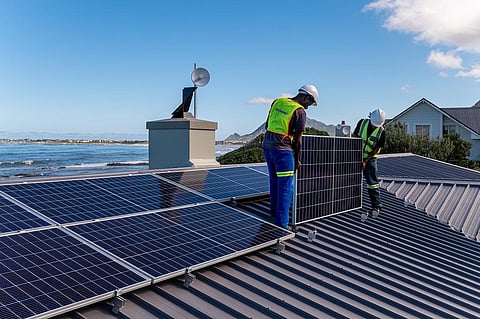

Most new dams proposed in Africa may remain unbuilt due to the increasing economic competitiveness of solar panels and the growing uncertain effects of climate change on river flows, according to a recent study.
Up to 67 per cent of possible future hydropower plants in Africa may not be worth the investment as hydropower will soon largely become unable to compete economically with solar and (to a lesser extent) wind power, whose costs have dropped at unprecedented rates in the last decade, added the research published in journal Science.
Only a very limited number of hydropower plants would remain attractive investments across the continent beyond 2030. “In addition, the effects of prolonged droughts on hydropower, likely to worsen due to climate change, would have to be mitigated through additional investments.”
The researchers modelled all hydropower plants in Africa individually — both existing and future candidates — to pinpoint which plants could be a smart investment and which should probably not be built.
They considered three socioeconomic scenarios considering land-use change, climate impacts on water availability, final energy demands and climate policy options to study the African energy systems’ expansion trajectory from 2020 to 2050 at the continental scale, assuming centralised decision-making.
The researchers considered Shared Socio-Economic Pathways (SSP), which are scenarios of projected socioeconomic global changes up to 2100. SSPs are used to derive greenhouse gas emissions scenarios with different climate policies.
They analysed scenarios of sustainable development (SSP1-2.6), heterogeneous economic development (SSP4-6.0) and fossil fuel-driven economic growth (SSP5-8.5) associated with high greenhouse gas emissions.
“The uncertainty of future hydropower generation is another reason why solar power will emerge as the more attractive technology in the long term,” said Matthias Wildemeersch, a researcher at the International Institute for Applied Systems Analysis and coauthor of the study.
Does this mean that it is “game over” for hydropower? The researchers said “not entirely”. In the short term, some new hydropower plants could still provide cheap power for countries in need. They could also be used flexibly to help the integration of solar and wind, whose output constantly fluctuates, they explained.
The findings showed that between 32 and 60 per cent of the proposed hydropower capacity is not cost-optimal. It also analyses that hardly any new hydropower will be built after 2030, meaning that its role in terms of installed capacity and generation will gradually decrease in favour of solar and wind power.
“Across the scenarios, hydropower expansion is robust in the Nile, Congo, and Niger river basins, whereas it remains uncertain in the Zambezi and smaller river basins.”
These findings emphasise the importance of connecting hydropower planning with capacity expansion models, as cost optimisation cannot be determined solely based on each project’s technical characteristics.
An increase in annual capital investment between 1 and 4 per cent at the continental level can ensure the reliability of the power system against hydroclimatic variability. Yet the required increase in capital investments and the observed reductions in vulnerability do not necessarily overlap at the country level.
As local interests conflict and diverge from system-wide ones, we underline the importance of electricity exchanges between countries and cooperation for power system reliability.
“Our model shows which specific hydropower plants would still be cost-effective in the short-term,” said Andrea Castelletti, professor in Natural Resources Management at Politecnico di Milano and senior author of the study.
“Especially in the Congo, Niger and Nile basins, there are certain projects that would be worth the effort, as long as they are well-planned and harmful environmental effects are kept to a minimum.”
But in the long-term, solar power would emerge as the favoured technology by most African countries, echoing the International Energy Agency’s 2020 claim that solar power would soon become the new “king” of electricity markets worldwide, according to the research.
“The window for hydropower in Africa to be a feasible investment is very rapidly closing,” added Sebastian Sterl, professor in Energy Meteorology at the Vrije Universiteit Brussel, Belgium, and senior scientist at the World Resources Institute.
Aside from cost-effectiveness, this is generally good news for the environment: It means that many rivers won’t have to be dammed and can keep their natural course, said Sterl.